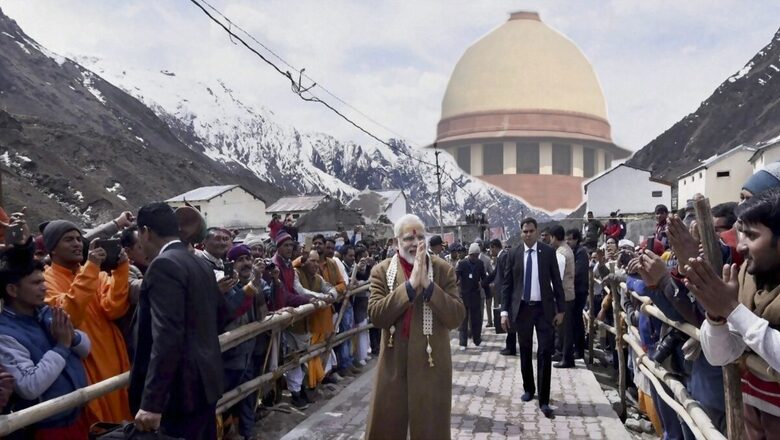
views
Prime Minister Narendra Modi on Tuesday penned his thoughts on the historic Supreme Court’s verdict on the abrogation of Article 370 and said the top court’s judgement enhanced the constitutional integration of Jammu and Kashmir with the rest of the country.
“In its verdict on 11th December, the Supreme Court has strengthened the spirit of ‘Ek Bharat, Shreshtha Bharat’ – it has reminded us that what defines us is the bonds of unity and a shared commitment to good governance. Today, every child born in Jammu, Kashmir and Ladakh is born with a clean canvas, where he or she can paint a future full of vibrant aspirations,” he said a blog post on his official website.
The Supreme Court on Monday upheld the government’s decision to abrogate Article 370 — which granted a special status to the erstwhile state of Jammu and Kashmir — and directed the Election Commission to hold Assembly elections in the Union Territory by September 30, 2024.
“Through its judgment, the Court has upheld the sovereignty and integrity of India, something that is cherished by every Indian. The Supreme Court rightly observed that the decision taken on August 5, 2019, was done with the purpose of enhancing constitutional integration and not disintegration,” PM Modi wrote
The Court has also recognised the fact that Article 370 was not permanent in nature.
The Prime Minister noted that for the last seven decades, Jammu and Kashmir have witnessed the worst form of violence and instability, “something which the wonderful people never deserved.”
“Unfortunately, due to centuries of colonisation, most notably economic and mental subjugation, we became a confused society of sorts. Rather than taking a clear position on very basic things, we allowed duality, leading to confusion. Sadly, Jammu and Kashmir became a big victim of such a mindset,” he said.
Modi stated that at the time of independence, India had a choice of making a fresh start for national integration. “Instead, we decided to continue with the confused society approach even if it meant ignoring the long-term national interests,” he said.
Elaborating on his connection with the former state, PM Modi said he belonged to an ideological framework where Jammu and Kashmir was not merely a political issue but was about addressing the aspirations of society.
Turning a page in history, the PM recalled the contributions of Dr Syama Prasad Mookerjee and former PM Atal Bihari Vajpayee in Jammu and Kashmir’s political history.
Dr Mookerjee, who held an important portfolio in the Pundit Jawahar Lal Nehru’s Cabinet, could have remained in government for a long time, PM Modi opined.
“Yet, he quit the Cabinet over the Kashmir issue and preferred the tough road ahead, even if it meant paying with his life. His efforts and sacrifice led to crores of Indians becoming emotionally attached with the Kashmir issue,” he noted.
“Years later, Atal Ji (Former PM Atal Bihari Vajpayee), at a public meeting in Srinagar gave the powerful message of ‘Insaniyat’, ‘Jamhooriyat’ and ‘Kashmiriyat’, which has also always been a source of great inspiration,” he added.
The Prime Minister asserted that it was always his firm belief that what had happened in Jammu and Kashmir was a great betrayal to the nation and the people living there.
“It was also my strong desire to do whatever I could to remove this blot, this injustice done to the people. I have always wanted to work to alleviate the suffering of the people of Jammu and Kashmir,” he said.
the Prime Minister called Articles 370 and 35 (A) as “major obstacles” and an “unbreakable wall” between the development of Jammu and Kashmir.
“Articles 370 and 35(A) ensured that the people of Jammu and Kashmir never got the rights and development that the rest of their fellow Indians got. Due to these Articles, a distance was created between people belonging to the same nation. Due to this distance, many people from our nation who wanted to work to solve the problems of Jammu and Kashmir were unable to do so even if they clearly felt the pain of the people there,” he opined.
The Prime Minister said he has seen these issues closely over the last several decades as a BJP Karyakarta, and knew that the people of Jammu and Kashmir want development and they want to contribute to the development of India based on their strengths and skills.
“Thus, while serving the people of Jammu and Kashmir, we gave primacy to three pillars- understanding of the citizens’ concerns, building trust through supportive actions, and prioritising development, development and more development,” he said as he recalled various development works done by his government between 2014 and 2019.
The Prime Minister then recalled the ‘historical day’ of August 5, 2019, when Parliament passed the decision to abrogate Article 370.
“Since then, much has changed in Jammu, Kashmir and Ladakh. The judicial court verdict came in December 2023 but seeing the wave of development across Jammu, Kashmir and Ladakh, the people’s court have given a resounding thumbs up to the Parliament’s decision of abolishing Articles 370 and 35(A) for four years now,” PM Modi said.
As per the Prime Minister, at the political level, the last 4 years have been marked with a renewed faith in grassroots democracy.
“The women, tribals, SC, ST and marginalised sections of society were not getting their due. At the same time, the aspirations of Ladakh were totally ignored. 5th August 2019 changed all that. All Central laws now apply without fear or favour Representation has also got more widespread- a three tier Panchayati Raj System is in place, BDC elections have been held, and refugee communities who were all but forgotten have begun to enjoy the fruits of development,” he said.
He further noted all how Central schemes–including Saubhagya, Ujwala and Ujjwala schemes– reached the ground in Jammu and Kashmir after the abrogation.
“Today, the dreams of the people are no longer prisoners of the past but are possibilities of the future. After all, Development, democracy and dignity have replaced disillusionment, disappointment and despondency,” he added.
















Comments
0 comment